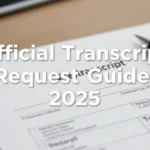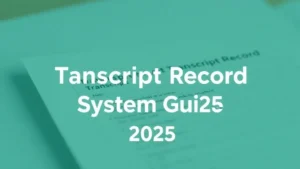Degree Transcript: How to Request Yours
Agree: You’ve just graduated or need to verify credentials, and now you’re wondering how to get that critical document. Promise: In this guide, you’ll discover exactly how to request your degree transcript, step by step. Preview: From understanding what a degree transcript is, to navigating fees, delivery options, and avoiding common pitfalls—you’ll be ready to hit “submit” with confidence.
Did you know that over 70% of U.S. universities now offer secure electronic transcript delivery? Source: NCES It’s faster than ever. You’ll breeze through this process. Seriously.
Table of Contents
What Is a Degree Transcript?
Hook: Ever wondered what makes a degree transcript different from a diploma? Context: Your diploma shows you graduated. A degree transcript details every course you took, grades earned, credits awarded and your official degree date. Detailed Explanation: It’s the official record issued by your registrar’s office. Employers and grad schools often require it for verification. Plus, some licensing boards won’t accept anything else. Example: Jane ordered hers to apply for a teaching certificate—she needed course-by-course proof. Blockquote:
“A transcript is the most comprehensive academic record you’ll ever hold,” says Registrar Office Specialist, CertifyMe.
Actionable Takeaway: Request one early, even if you’re just exploring options.
Why You Need Your Degree Transcript
Hook: You might be wondering, “Why can’t I just send my diploma?” Context: Diplomas are ceremonial—they lack detail. Transcripts prove your performance. Detailed Explanation: For job applications, transcripts showcase GPA, coursework rigor and honors. Graduate programs demand transcripts to assess prerequisites and readiness. Immigration processes often require notarized transcripts too. Example: When applying for a visa, Ahmed had to submit a sealed transcript, not his diploma. Expert Data: According to a 2024 survey by the National Association of Colleges and Employers, 68% of employers request transcripts. Actionable Takeaway: Always confirm requirements early—don’t get caught off-guard.
How to Request Your Degree Transcript: Step-by-Step
Hook: Ready to press “order”? Let’s break it down. Context: Most institutions offer three methods: online portal, mail, or in-person. Follow these steps for fastest results:
- Gather Required Information: Student ID, date of birth, graduation year, current address.
- Choose Delivery Method: Electronic PDF (24–48 hours) vs. USPS mail (2–14 business days).
- Complete Request Form: Online portals (e.g., Parchment) or downloadable PDF from your registrar’s site.
- Pay Fees: Typically $5–$15 per transcript via credit/debit card.
- Submit and Track: Save confirmation number and use portal dashboard to monitor status.
Example: Lisa used her university’s self-service portal to request three copies—one for her employer, one for grad school, and one to keep on file. She tracked delivery in real time. Expert Quote:
“Using online portals for transcript requests not only speeds up processing but also reduces errors and improves traceability.” – Registrar Office Specialist, CertifyMe
Actionable Takeaway: Double-check your address and recipient email before submitting.
Delivery Options and Processing Times
Hook: Fast transcript? Yes, please. Context: Understanding timelines helps you plan. Typical range: 2–14 business days. Peak periods around semester start/end can add delays.
- Certified Electronic PDF: 24–48 hours via Parchment or FASTER.
- Electronic Exchange Services: Real-time exchange between institutions (e.g., online-portal-guide).
- Physical Mail (USPS): 5–14 business days; add tracking for $2–$5.
Example: A mid-sized public college reported an average 3-day turnaround for electronic requests, even in summer. Actionable Takeaway: Opt for certified PDF when deadlines loom.
Fees, Payment Methods, and Avoiding Common Mistakes
Hook: Don’t let fees sneak up on you. Context: Fees range from $5–$15 per transcript; some schools charge extra for expedited shipping. Payment Methods: Credit/debit; rarely cash. Detailed Explanation: Many institutions now disclose fees upfront on their websites. No surprises. Be cautious of foreign transaction fees if ordering internationally.
Example: Carlos’ order got stuck because of a $12 library fine. He thought it wouldn’t matter. It did. Expert Data: Holds delay requests by an average of 5 days, reports SDSU Registrar. Actionable Takeaway: Clear all holds and confirm zero balance before ordering.
Advanced Tips and Future Trends in Transcript Requests
Hook: Want to stay ahead of the curve? Context: Digital transformation is reshaping transcripts. Detailed Explanation: Expect more self-service options, mobile apps, and blockchain-secured credentials. AI-driven verification is on the horizon, reducing fraud. Example: A startup is piloting biometric-secured transcript delivery in 2025.
Expert Quote:
“Institutions embracing real-time status updates and blockchain will set the new standard by 2026.” – Higher Ed Tech Review
Actionable Takeaway: Sign up for your alma mater’s alumni portal to access new digital services as they roll out.
FAQ
- How long does it take to get a degree transcript?
- Typically 2–14 business days; 24–48 hours for certified electronic delivery.
- Can I request multiple transcripts at once?
- Yes—most portals let you order several copies for the same fee per document.
- What if I have a hold on my student account?
- Resolve fines or holds first; otherwise, your request will be rejected or delayed.
- Are electronic transcripts accepted by employers?
- Most employers now accept secure PDFs. Always verify with the recipient.
- Can I attach supplemental documents?
- Some universities let you include resumes or cover letters—check your registrar’s policy.
Conclusion
Summarize: Obtaining your degree transcript doesn’t have to be a headache. You now know what it is, why you need it, and exactly how to request it. Reinforce Benefit: Armed with these steps, you’ll avoid delays, extra fees, and common mistakes. Next Steps:
- Check your student account for holds today.
- Gather your personal and recipient information.
- Place your order via your institution’s portal (or transcript-fees page) before your application deadline.
End Note: Ready, set, request—your transcript is just a few clicks away. Good luck! You’ve got this.





